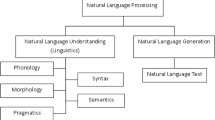Abstract
In negotiation by electronic means, language is an important deal-making tool which helps realize negotiation strategies. Negotiators may use language to request information, exchange offers, persuade, threaten, as well as reach a compromise or find prospective partners. All this is recorded in texts exchanged by negotiators. We explore the language signals of strategies—argumentation, persuasion, negation, proposition. Leech and Svartvik’s approach to language in communication gives our study the necessary systematic background. It combines pragmatics, the communicative grammar and the meaning of English verbs. Language signals become features in the task of classifying those texts. We employ Statistical Natural Language Processing and Machine Learning techniques to find general trends that negotiation texts exhibit. Our hypothesis is that language signals help predict negotiation outcomes. We run experiments on the Inspire data. The electronic negotiation support system Inspire was gathering data for several years. The data include text messages which negotiators may exchange while trading offers. We conduct a series of Machine Learning experiments to predict the negotiation outcome from the texts associated with first halves of negotiations. We compare the results with the classification of complete negotiations. We conclude the paper with an analysis of the results and a list of suggestions for future work.
Similar content being viewed by others
References
Alpaydin E (2004) Introduction to machine learning. MIT Press
Brett JM (2001) Negotiating globally. Jossey-Bass, San Francisco
Cellich C, Jain SC (2004) Global business negotiations: a practical guide. Thomson, South-Western
Cherkassky V, Muller F (1998) Learning from data. Wiley
Cowie R, Douglas-Cowie E, Apolloni B, Taylor J, Romano A, Fellenz W (1999). What a neural net need to know about emotion words. In: Mastorakis N (ed) Computational intelligence and applications (CSCC ’99), pp 109–114
Devillers L, Lamel L, Vasilescu I (2003) Emotion detection in task-oriented spoken dialogs. In: Proc of IEEE internation conference multimedia and expo, Baltimore, pp 549–552
Donohue WA, Ramesh CN (1992) Negotiator–opponent relationships. In: Putnam L, Roloff M (eds) Communication and negotiation. Sage, London, pp 209–232
Galley M, McKeown K, Hirschberg J, Shriberg E (2004) Identifying agreement and disagreement in conversational speech: use of bayesian networks to model pragmatic dependencies. In: Proceedings of ACL’2004, pp 669–676
Gebauer J, Scharl A (1999) Between flexibility and automation: an evaluation of web technology from a business process perspective. J Comp-Med Commun 5(2). http://www.ascusc.org/jcmc/vol5/issue2/gebauer.htm.
Gries ST (2003) Multifactorial analysis in corpus linguistics. Continuum, New York
Hargie O, Dickson D (2004) Skilled interpersonal communication: research, theory and practice, 4th edn. Routledge
Johannesson NL (1976) The english modal auxiliaries: a stratificational account. Acta Universitatis Stockholmiensis,
Jurafsky D, Martin JH (2000) Speech and language processing. Prentice Hall
Kersten GE(2003) The science and engineering of e-negotiation: an introduction. In: Proceedings of 36th Hawaii international conference on system sciences (HICSS – 2003), pp 27–36
Kersten GE et al (2002–2006) Electronic negotiations, media and transactions for socio-economic interactions, http://www.interneg.org/enegotiation
Kersten GE, Zhang G (2003) Mining inspire data for the determinants of successful internet negotiations. Central Eur J Operat Res 11(3):297–316
Koeszegi S, Pesendorfer E-M, Srnka K(2006) Electronic negotiations a comparison of different support systems. Die Betriebswirtschaft 64(4):44–463
Roloff M (ed), Putnam L (1992) Communication and negotiation. Sage, London
Leech G, Svartvik J (2002) A Communicative Grammar of English. Longman
Leech GN (1983) Principles of pragmatics. Longman
Leech GN (2004) Meaning and the English Verb. Longman
Koper R, Burrell N (1998) The efficacy of powerful/powerless language on attitudes and source credibility. In: Allen M, Preiss R (eds) Persuasion: advances through meta-analysis. Hampton Press, pp 203–215
Nastase V (2005) Concession curve for inspire data. Group Decis Negot 15(2):185–193
Nasukawa T, Yi J (2003) Sentiment analysis: Capturing favorability using natural language processing. In: Proc ICKC, pp 70–77
Nigam K, Hurst M (2004) Towards a robust metric of opinion. In: AAAI Spring Symposium on Exploring Attitude and Affect in Text
Perkins MR (1983) Modal expressions in english. Ablex Publishing Corporation
Schoop M (2003) A language-action approach to electronic negotiations. In: Proc 8th international working conference on the language-action perspective on communication modelling (LAP 2003), pp 143–160
Sebastiani F (2002) Machine learning in automate text categoriazation. ACM Comput Surv 34(1):1–47
Sjostedt G (ed) (2003) Professional cultures in international negotiations. Lexington Books
Sokolova M, Nastase V, Szpakowicz S (2004)Language in electronic negotiations: patterns in completed and uncompleted negotiations. In: Natural language processing (Proceedings of 3rd international conference on natural language processing (ICON ’2004)), pp 142–151
Sokolova M, Nastase V, Szpakowicz S, Shah M (2005) Analysis and models of language in electronic negotiations. In: Draminski M, Grzegorzewski P, Trojanowski K, Zadrozny S (eds) Issues in intelligent systems. Models and Techniques, EXIT, Warszawa, pp 197–211
Sokolova M, Szpakowicz S (2005) Analysis and classification of strategies in electronic negotiations. In: Advances in artificial intelligence (Proceedings of 18th conference of the canadian society for computational studies of intelligence (AI ’05)), pp 145–157
Srnka K, Koeszegi S (2007) From words to numbers—how to transform rich qualitative data into meaningful quantitative results: guidelines and exemplary study. Schmalenbach’s Bus Rev 59:29–57
Ströbel M (2000) Effects of electronic markets on negotiation process. In: Proceedings of the 8th European conference on information systems, Vienna, vol 1, pp 445–452
Thompson LL (2005) The mind and heart of the negotiator, 3rd edn. Pearson Prentice Hall
Tottie G (1991) Negation in english speech and writing. Academic Press Inc.
Warren B (1984) Classifying adjectives. Acta Universitatis Gothoburgensis
Witten I, Frank E (2005) Data Mining Morgan Kaufmann, http://www.cs.waikato.ac.nz/ml/weka
Acknowledgements
This work has been supported by a project on electronic negotiations, part of the Initiative on the New Economy of the Social Sciences and Humanities Research Council of Canada. Support also came from the Natural Sciences and Engineering Research Council of Canada. For the Inspire data we thank the InterNeg team led by Gregory Kersten.
Author information
Authors and Affiliations
Corresponding author
Rights and permissions
About this article
Cite this article
Sokolova, M., Szpakowicz, S. Strategies and language trends in learning success and failure of negotiation. Group Decis Negot 16, 469–484 (2007). https://doi.org/10.1007/s10726-007-9083-9
Received:
Accepted:
Published:
Issue Date:
DOI: https://doi.org/10.1007/s10726-007-9083-9




